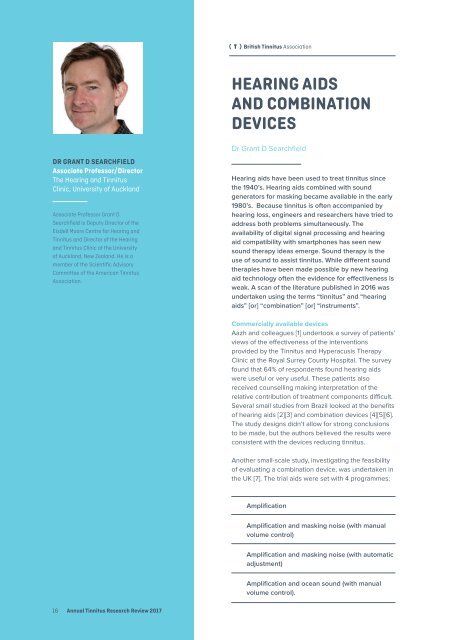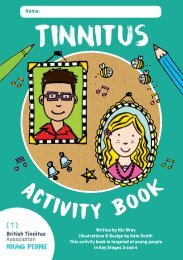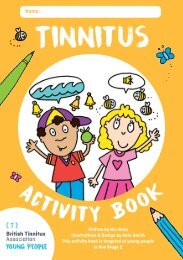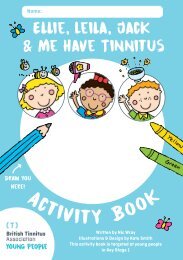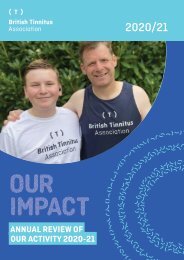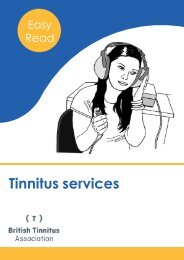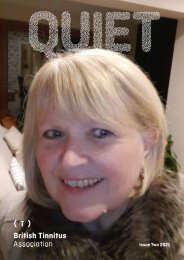Hearing Aids and Combination Devices
You also want an ePaper? Increase the reach of your titles
YUMPU automatically turns print PDFs into web optimized ePapers that Google loves.
T<br />
British Tinnitus Association<br />
<strong>Hearing</strong> aids<br />
<strong>and</strong> combination<br />
devices<br />
DR GRANT D SEARCHFIELD<br />
Associate Professor/Director<br />
The <strong>Hearing</strong> <strong>and</strong> Tinnitus<br />
Clinic, University of Auckl<strong>and</strong><br />
Associate Professor Grant D<br />
Searchfield is Deputy Director of the<br />
Eisdell Moore Centre for <strong>Hearing</strong> <strong>and</strong><br />
Tinnitus <strong>and</strong> Director of the <strong>Hearing</strong><br />
<strong>and</strong> Tinnitus Clinic at the University<br />
of Auckl<strong>and</strong>, New Zeal<strong>and</strong>. He is a<br />
member of the Scientific Advisory<br />
Committee of the American Tinnitus<br />
Association.<br />
Dr Grant D Searchfield<br />
<strong>Hearing</strong> aids have been used to treat tinnitus since<br />
the 1940’s. <strong>Hearing</strong> aids combined with sound<br />
generators for masking became available in the early<br />
1980’s. Because tinnitus is often accompanied by<br />
hearing loss, engineers <strong>and</strong> researchers have tried to<br />
address both problems simultaneously. The<br />
availability of digital signal processing <strong>and</strong> hearing<br />
aid compatibility with smartphones has seen new<br />
sound therapy ideas emerge. Sound therapy is the<br />
use of sound to assist tinnitus. While different sound<br />
therapies have been made possible by new hearing<br />
aid technology often the evidence for effectiveness is<br />
weak. A scan of the literature published in 2016 was<br />
undertaken using the terms “tinnitus” <strong>and</strong> “hearing<br />
aids” [or] “combination” [or] “instruments”.<br />
Commercially available devices<br />
Aazh <strong>and</strong> colleagues [1] undertook a survey of patients’<br />
views of the effectiveness of the interventions<br />
provided by the Tinnitus <strong>and</strong> Hyperacusis Therapy<br />
Clinic at the Royal Surrey County Hospital. The survey<br />
found that 64% of respondents found hearing aids<br />
were useful or very useful. These patients also<br />
received counselling making interpretation of the<br />
relative contribution of treatment components difficult.<br />
Several small studies from Brazil looked at the benefits<br />
of hearing aids [2][3] <strong>and</strong> combination devices [4][5][6].<br />
The study designs didn’t allow for strong conclusions<br />
to be made, but the authors believed the results were<br />
consistent with the devices reducing tinnitus.<br />
Another small-scale study, investigating the feasibility<br />
of evaluating a combination device, was undertaken in<br />
the UK [7]. The trial aids were set with 4 programmes:<br />
Amplification<br />
Amplification <strong>and</strong> masking noise (with manual<br />
volume control)<br />
Amplification <strong>and</strong> masking noise (with automatic<br />
adjustment)<br />
Amplification <strong>and</strong> ocean sound (with manual<br />
volume control).<br />
16<br />
Annual Tinnitus Research Review 2017


